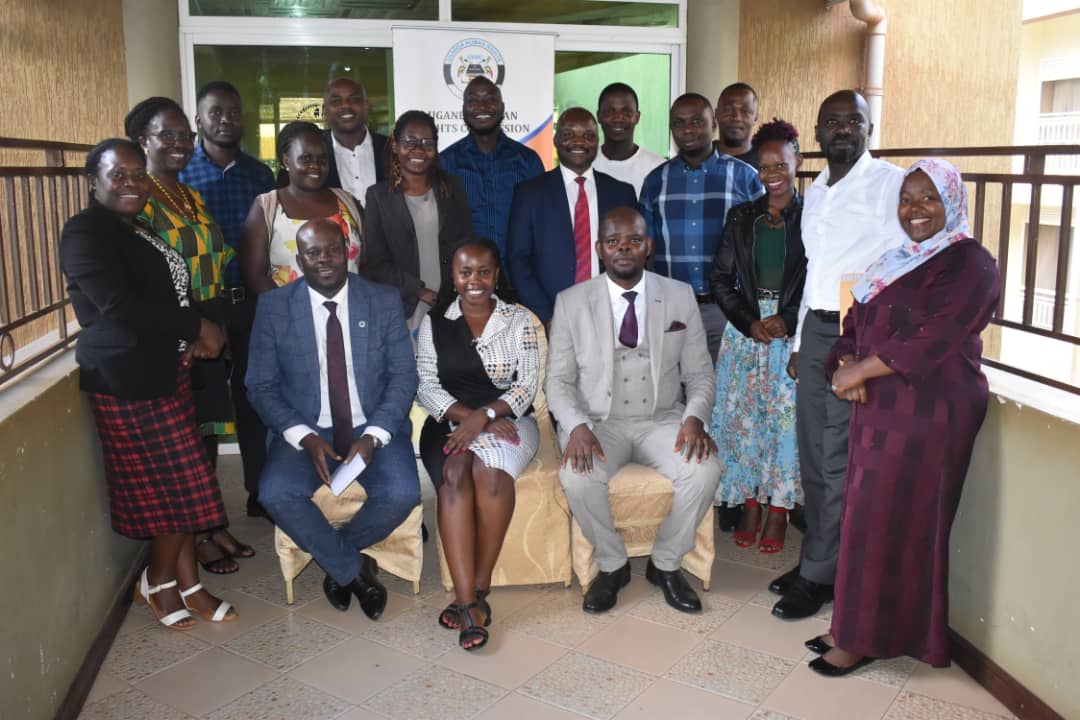
The Uganda Human Rights Commission (UHRC) has trained over 25 registered companies involved in labour externalization in Uganda. While opening this training on Thursday (September 28, 2023), the Secretary to the Commission Ms. Margaret Ejang revealed that the training was a result of several other prior engagements with the business community in human rights.
“In our [previous] engagements, the Commission has established that many positive strides have been made by the Government, its non-government partners, the private sector and all other relevant stakeholders to formalize, clean up and monitor the externalization of labor. This is because of its potential to effectively contribute to tackling the current levels of unemployment or under-employment. One fundamental factor identified as a challenge was the inadequate awareness of human rights, the policy and legal framework within which the externalization of labor should occur. Today’s engagement with recruitment companies, therefore, is strategic and part of the efforts to implement the recommendations,” she said.
She assured the business community that observance of human rights is not costly and counterproductive as some business people tend to reason, but a very good thing for business. She said the business community needs to appreciate that labor is about human beings whose protection of their human dignity surpassed all other pursuits.
Prior to her opening remarks, the Director Research Education and Documentation (RED) Mr. Byonabye Kamadi whose directorate spearheaded this training informed the meeting about the mandate of the UHRC and the history of how it came into existence. He also took the representatives through their duties and responsibilities as recruiting agencies and as citizens as stated under Article 17 of the Constitution as well as the National Objectives and Directive Principals of State Policy.
“Those girls have rights but also duties and responsibilities. They have their right to be involved in gainful employment but also have an obligation to perform as per the contract,” he said.
He revealed that in the coming general elections in 2026, all Ugandans abroad, including girls who are exported as house managers in Saudi Arabia will be eligible to exercise their rights to vote.
The representatives however argued that this will be a little complex given that in Saudi Arabia, people sleep the whole day and work during the night, that is, from 5:00pm to 11:00Pm. They also reasoned that it may also be difficult for some bosses for whom these girls work to allow them move out just for purposes of going to vote.
Director Kamadi informed them that the modalities of how the girls will exercise their rights will be worked out between the Ministry of Foreign Affairs and the Electoral Commission but currently all that needs to be done is for the recruitment companies and other stakeholders to recognize that the right to vote for people abroad, now exists.
Senior Human Rights Officer Ms. Rosemary Kemigisha took the recruiters through the various human rights concepts like the Human Rights Based Approach (HRBA) which means putting the people at the center of every decision-making.
“Development is about making positive informed choices about people’s lives and dignity. Development is not charity but an obligation to fulfil human rights. Under the HRBA, development can become a legal claim,” she said.
She also explained the concept of business and human rights among other concept while emphasizing that everything needs to be looked at with a Human Rights lense. She urged the representatives to take interest in knowing the ratification status of UN Conventions by those countries where they externalize labor so that in case anything goes wrong, they can make an appeal directly to the UN.
The representatives of recruitment companies still pointed out that the biggest challenge they face is that there is only one embassy in Riyadh which takes care of immigration issues for over five countries including Saud Arabia which itself is the size of almost the entire East Africa. They claimed the said embassy is also under facilitated by the Uganda government.
“This becomes very difficult for us to quickly follow up in case an issue arise. Imagine you have a girl in a state which is as far as Nairobi Kenya and the Embassy is like in Kampala or Kabale. Even if you are to advise her to escape, it becomes very difficult for her to travel such a distance without being caught up by her bosses. Secondly, the police there appeared to be strained by cases involving domestic workers because they are frequent and sometimes you find the officers don’t comprehend the English language. So quite often they just look on or just arrest the girl and return her to her boss,” one of them explained.
Ms. Dora Nanteza from the Department of Labor Externalization in the Ministry of Gender Labor and Social Development which regulate the externalization companies explained the various licensing and other regulatory legal frameworks that guide labor externalization in Uganda. She said before they suspend any company’s license, they first give the operators an opportunity to respond to the allegations.
The training ended with various recommendations among which is was for the Commission to convene another high-level meeting involving the Permanent Secretaries in the Ministry of Gender, Ministry of Foreign Affairs, Internal Affairs and other high-ranking officers so that some binding resolution aimed at streamlining the operations of these companies are reached.
